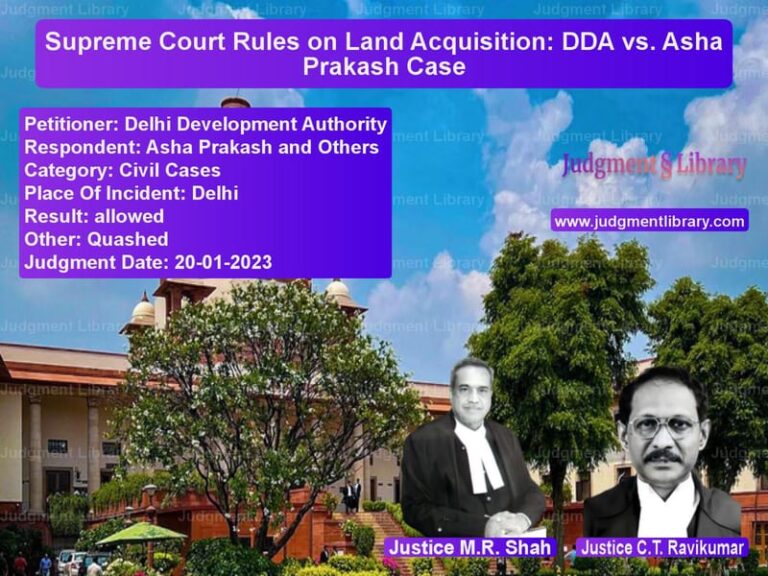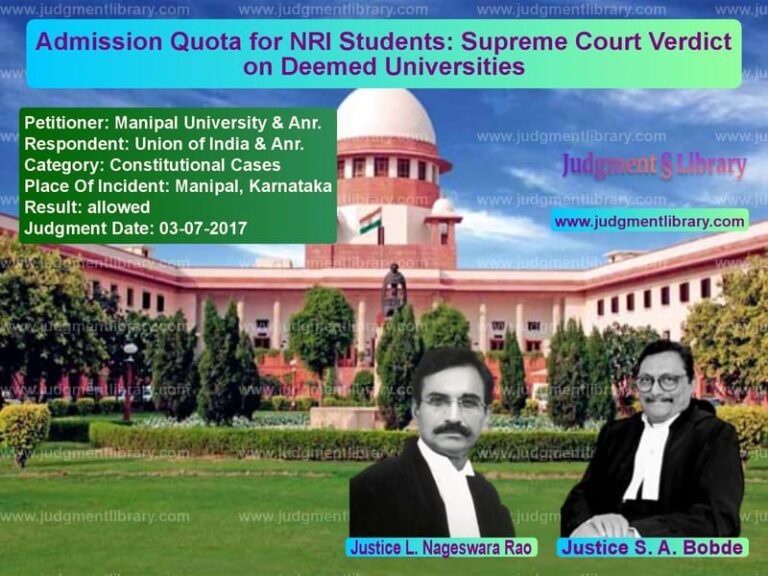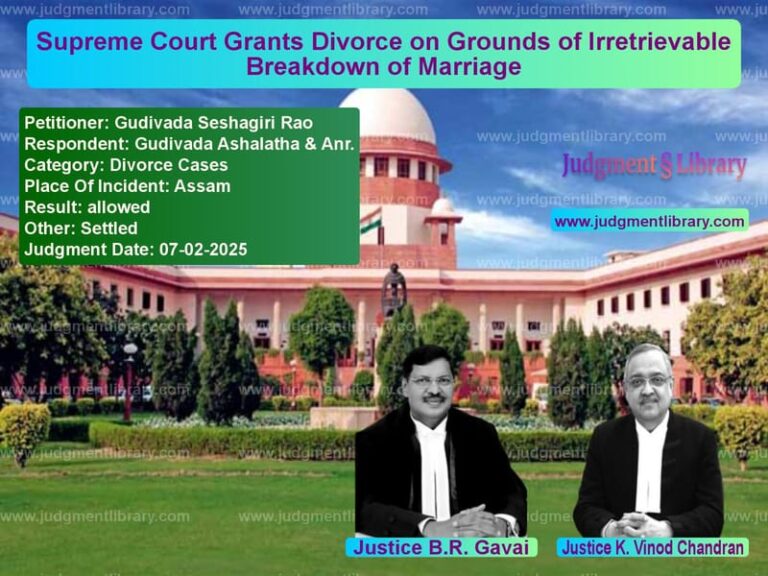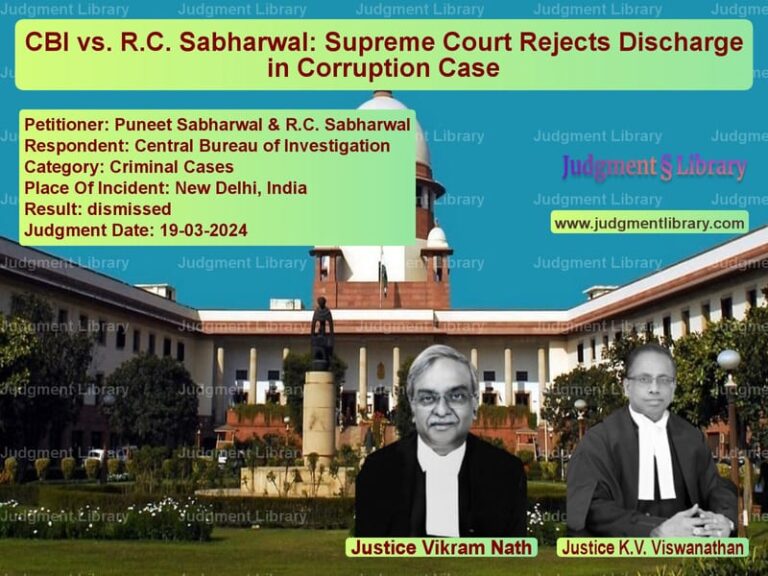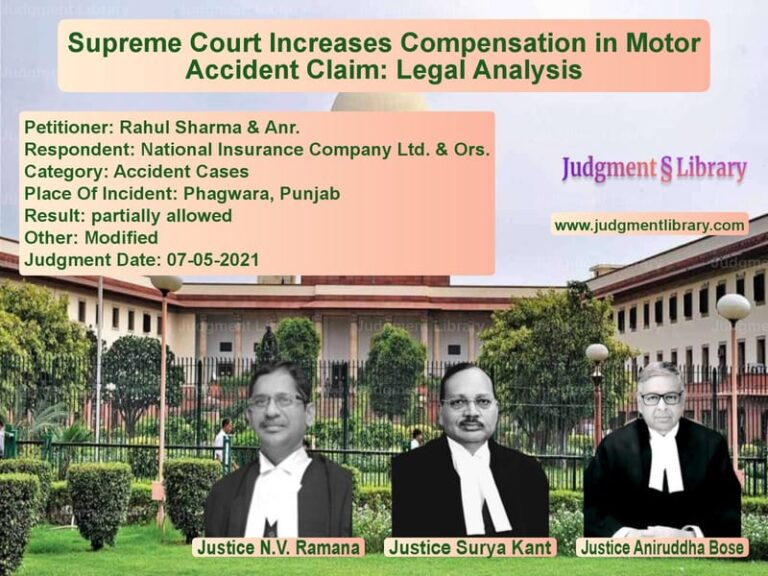Dishonestly Receiving Stolen Property: The Case of Shiv Kumar vs State of Madhya Pradesh
The case of Shiv Kumar vs State of Madhya Pradesh revolves around the criminal conviction of the appellant, Shiv Kumar, under Section 411 of the Indian Penal Code (IPC) for dishonestly receiving stolen property. The prosecution alleged that the appellant knowingly received goods stolen from a truck, which was looted by co-accused Sadhu Singh and others. Despite the charges, the appellant contended that there was insufficient evidence to prove his knowledge of the stolen nature of the goods, which became the central issue in the appeal before the Supreme Court.
Background of the Case
The appellant, Shiv Kumar, was implicated in a case where a truck carrying goods was hijacked by a group of criminals, including the co-accused Sadhu Singh. The stolen goods, including utensils, clothes, and electrical items, were later sold by the appellant at his shop. The prosecution argued that the appellant had received the stolen goods knowing them to be stolen and sold them at a cheaper price. The appellant was convicted under Section 411 IPC by the trial court, a decision upheld by the High Court of Madhya Pradesh. This led to an appeal in the Supreme Court.
The appellant contended that there was no direct evidence to prove that he had knowledge that the goods he received were stolen. He argued that the prosecution’s case lacked the necessary element of mens rea (guilty mind), which is essential for a conviction under Section 411 IPC. The appellant’s defense also highlighted inconsistencies in the testimonies of the witnesses and the seizure procedures that were followed by the police.
Read also: https://judgmentlibrary.com/supreme-court-acquits-two-trade-union-leaders-in-assam-murder-case/
The Petitioner’s Arguments
The appellant’s counsel, Mr. Lav Kumar Agrawal, argued that the essential ingredients of the offense under Section 411 IPC were not made out in this case. According to the appellant, the prosecution had failed to adduce any evidence that could conclusively show that the appellant knew the goods he was in possession of were stolen. The appellant contended that merely receiving goods at a cheaper price does not automatically imply that the recipient was aware of their stolen nature. He further argued that the prosecution had failed to prove the mens rea required to establish the offense.
The appellant also pointed out that the testimonies of the witnesses, including PW-5 (Nitin Jain), PW-22 (Bharat Singh Thakur), and PW-24 (G.P. Tiwari), were contradictory and unreliable. The appellant argued that the testimonies did not support the claim that the appellant knew the goods were stolen, and the prosecution had not established any clear link between the appellant and the stolen truck.
The Respondent’s Arguments
The respondent, the State of Madhya Pradesh, supported the conviction and argued that there was sufficient evidence to prove that the appellant was aware that the goods he received were stolen. The State’s counsel, Mr. Gopal Jha, pointed to the appellant’s possession of the stolen goods, which were sold at a lower price than their market value, as evidence of the appellant’s knowledge. The State argued that the appellant’s actions in selling the goods at a cheaper rate were consistent with the behavior of someone who knows the property is stolen.
The State also relied on the testimony of witnesses, including Nitin Jain (PW-5), who confirmed that the goods were being sold at the appellant’s shop. The State also referenced the seizure memo (Exhibit P-4 and Exhibit P-5), which documented the confiscation of the stolen goods from the appellant’s possession. The State’s counsel referred to the precedent in Nagappa Dondiba Kalal v. State of Karnataka (1980), where the Court held that a person receiving stolen property could be convicted under Section 411 IPC if they knew or had reason to believe that the property was stolen.
Read also: https://judgmentlibrary.com/supreme-court-modifies-sentence-in-maharashtra-assault-case/
The Court’s Analysis
The Supreme Court carefully analyzed the case, focusing on the crucial element of mens rea in the offense under Section 411 IPC. The Court noted that the prosecution must prove beyond a reasonable doubt that the accused had knowledge that the property was stolen. The Court pointed out that possession of stolen goods alone is not enough to establish guilt under Section 411 IPC; there must be evidence that the accused knowingly received the stolen property.
The Court also addressed the issue of the appellant’s involvement in the sale of the stolen goods. While the appellant’s shop was selling goods at a discounted price, the Court found no direct evidence to link this action with the appellant’s knowledge that the goods were stolen. The Court noted that selling goods at a cheaper price was not an automatic indicator that the seller knew the property was stolen. The Court emphasized that mere suspicion or knowledge based on indirect evidence was insufficient to convict the appellant under Section 411 IPC.
The Court also highlighted the contradictions in the testimonies of the witnesses. The Court observed that the seizure process was not conducted in a manner that would support a reliable conviction. The failure to establish a direct connection between the appellant and the stolen goods weakened the prosecution’s case.
Final Judgment
The Supreme Court ruled in favor of the appellant and acquitted him of the charges under Section 411 IPC. The Court held that the prosecution had failed to establish the essential element of knowledge that the goods in the appellant’s possession were stolen. The Court emphasized that the conviction under Section 411 IPC could not be sustained without clear evidence of the appellant’s awareness that the property was stolen. The Court found that the evidence presented by the prosecution was insufficient to prove the appellant’s guilt beyond a reasonable doubt.
Read also: https://judgmentlibrary.com/anticipatory-bail-granted-in-rape-case-supreme-courts-detailed-analysis/
Significance of the Judgment
This judgment is significant in highlighting the importance of mens rea in criminal offenses, particularly in cases involving the possession of stolen property. The Court reaffirmed that mere possession of stolen goods, without the necessary knowledge of their stolen nature, is not sufficient to establish a conviction under Section 411 IPC. The ruling also underscores the importance of reliable and consistent evidence in criminal cases, as the contradictions in the testimonies of the witnesses played a pivotal role in the Court’s decision to acquit the appellant.
The judgment also emphasizes the principle that the prosecution must prove each element of the offense beyond a reasonable doubt. In this case, the Court applied this principle to ensure that the appellant’s fundamental rights were upheld, and he was not convicted based on insufficient or inconsistent evidence.
Petitioner Name: Shiv Kumar.Respondent Name: State of Madhya Pradesh.Judgment By: Justice Hrishikesh Roy, Justice K.M. Joseph.Place Of Incident: Madhya Pradesh, India.Judgment Date: 07-09-2022.
Don’t miss out on the full details! Download the complete judgment in PDF format below and gain valuable insights instantly!
Download Judgment: shiv-kumar-vs-state-of-madhya-prad-supreme-court-of-india-judgment-dated-07-09-2022.pdf
Directly Download Judgment: Directly download this Judgment
See all petitions in Theft and Robbery Cases
See all petitions in Fraud and Forgery
See all petitions in Judgment by Hrishikesh Roy
See all petitions in Judgment by K.M. Joseph
See all petitions in allowed
See all petitions in Quashed
See all petitions in supreme court of India judgments September 2022
See all petitions in 2022 judgments
See all posts in Criminal Cases Category
See all allowed petitions in Criminal Cases Category
See all Dismissed petitions in Criminal Cases Category
See all partially allowed petitions in Criminal Cases Category


